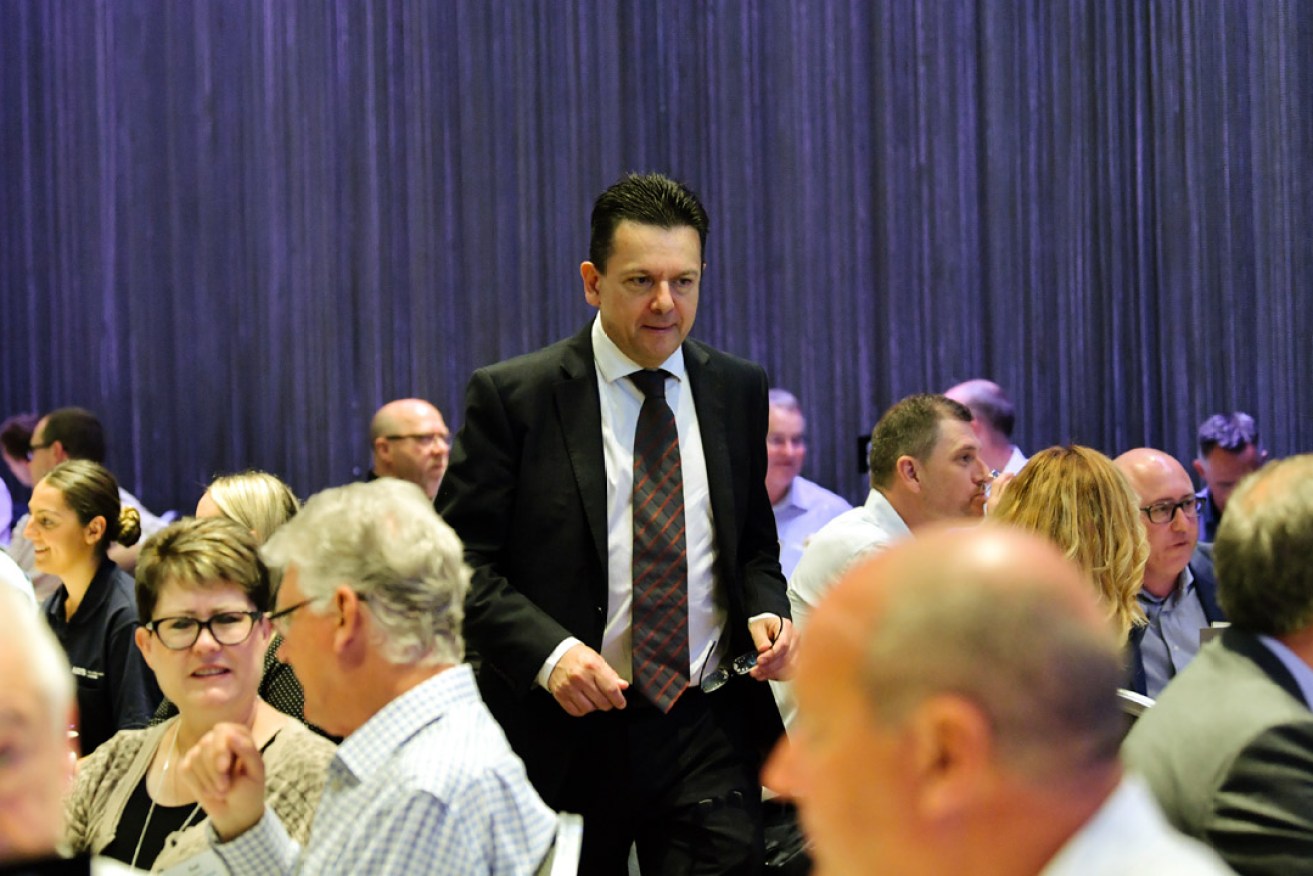Xenophon wants blowtorch for local councils
Nick Xenophon wants to set up a standing committee of parliament to scrutinise council decisions and a Senate estimates-style process to allow local residents to grill their representatives.


Xenophon told this morning's breakfast that he wants an Infrastructure SA body with "more teeth" than the Liberal Party's policy. Photo: AAP / Morgan Sette
The SA Best leader told a Civil Contractors’ Federation breakfast this morning that he wanted to apply more scrutiny to the local government sector, should his candidates grab the balance of power at the state election next March.
Xenophon also used the occasion to warn that the state’s Department of Planning, Transport and Infrastructure had been “hollowed out” by lawyers appointed to top jobs that he argued should be held by engineers, and one-upped the Liberal Party’s Infrastructure SA policy.
He told the crowd he wanted to establish a standing committee of parliament to inquire into councils’ decisions, processes, expenditure and bureaucracy.
“I think there should be an ability for residents to have, almost, an estimates process of local councils – to ask them how they spend their money,” he told about 100 industry representatives, seated in a function room at the Hilton Hotel.
“There should also be a standing parliamentary committee on local government – something that I wasn’t planning on announcing today.
“I think that would be a very healthy thing, to get some rigour in the local government sector.”
Xenophon acknowledged criticism for reneging on his support for rate-capping last month, but described the policy as “superficial”.
He told InDaily giving parliament the power to interrogate councils was “a much more effective mechanism than rate-capping” to keep the level of government accountable.
Deputy SA Liberal Party Leader Vickie Chapman said her party would also consider establishing a local government parliamentary committee, but slammed Xenophon for his backflip.
“Nick Xenophon has been spooked by the Local Government Association’s ratepayer-funded political advertising campaign and backflipped on his commitment to support council rate capping,” she said.
“If elected, a Marshall Liberal Government will introduce council rate capping to ensure ratepayers are not penalised for council waste and mismanagement.
“We will consider the establishment of a parliamentary committee and increased scrutiny of council budgets, but that would need to be in addition to rate capping.”
Local Government Association president, Onkaparinga mayor Lorraine Rosenberg, argued that councils were already highly accountable.
“We believe local government is already the most transparent and efficient sphere of government, and agree with Nick that rate capping will not deliver savings or efficiencies for communities,” Rosenberg told InDaily.
“We will provide a sector-endorsed reform package to all political parties before the next election, and ask them to support the sector driving its own reform agenda.”
She added that councils were keen to work “collaboratively with all political parties on opportunities to make local government even better, and look forward to discussing Nick’s ideas with him”.
Xenophon said he would field candidates in up to 20 seats at next year’s state election, contesting about the same number of seats held by members from both major parties – but all but one of the candidates he has announced so-far are to contest Liberal-held seats.
He used the keynote speech to announce he favoured establishing an independent authority to decide on the state’s major infrastructure builds, named Infrastructure SA.
It draws on a long-held SA Liberal Party policy to establish a body of the same name – but he said his version would have more teeth.
“It would be a statutory authority, not a mere advisory board as the opposition proposes,” he told the crowd.
“And a government should not be to override Infrastructure SA on projects unless it goes through the parliament.
“Having Infrastructure SA in place – obviously after extensive consultation with your sector, other key sectors and independent experts – will not only ensure value for money but prevent the blatantly political decisions that governments are all too often tempted to make, time after time, particularly in the lead up to an election.”
He said that the authority would eschew the construction industry’s boom-bust cycle associated with the timing of elections.
Liberal Party Leader Steven Marshall told InDaily it was “good to hear Nick has decided to participate in the public policy debate rather than focus on cheap stunts”.
“A Liberal Government will task Infrastructure SA with developing a 20 year productive infrastructure plan to upgrade our road, rail, ports, airports, water augmentation and electricity augmentation,” said Marshall.
“South Australia has been let down by a Labor Government that has failed to properly plan and manage major infrastructure projects.
“The Liberal plan will end 16 years of Labor’s pet projects around marginal seats and electoral cycles – this policy has left SA starved of the productive infrastructure we need to grow our state’s economy.”
But Premier Jay Weatherill said there were already enough authorities scrutinising the Government’s infrastructure decisions.
“For God’s sake, let’s just get on and make decisions … people just want action,” he said.
“We’ve got an Infrastructure Australia, we’ve got (the) Public Works Committee, we’ve got parliament; there’s any number of bodies that scrutinise Government decision-making.
“Just another committee – I mean, we’re more interested in delivering projects.”
Xenophon, a lawyer by training, added that he was worried by the politicisation of the public service, and that the state’s Department of Planning, Transport and Infrastructure had been “hollowed out” with the replacement of too many engineers in decision-making roles with lawyers.
“I have nothing against lawyers … but I don’t think they should be making big decisions about infrastructure.
“You need that engineering expertise back in there.”




